Share
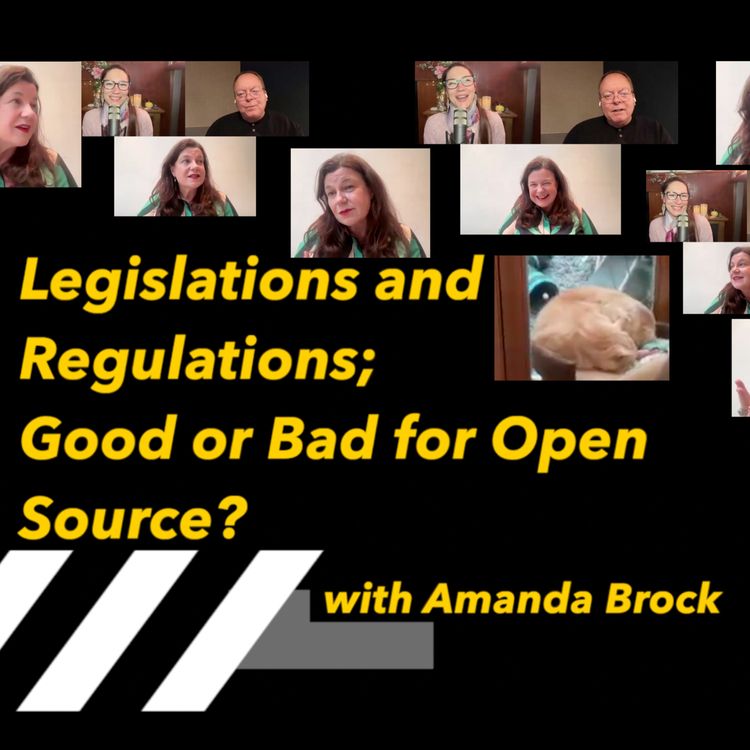
My Open Source Experience Podcast
Are Legislations Good or Bad for Open Source?
Governments around the globe have been recognizing that open source code is a core dependency in every modern software solution. Whether or not it is a good thing that is still a question. But one thing is for sure, if you are involved in an open source project or selling a product or service that depends on one, this will affect you!
In the commercial world, when something goes wrong with a product or service that a company provides, the company is liable for damages. So, what happens when a solution that contains open source code fails? And especially, what happens if the bug or vulnerability was introduced by the open source component? Who is liable? Is it the developer? Is it the open source community? Is it the company who used the code? Or?
In this episode of the My Open Source Experience Podcast, Ildiko and Phil are chatting with Amanda Brock. Before becoming the CEO of OpenUK, Amanda used to be a lawyer. With that background, it is no surprise that she keeps a close eye on the legislations and regulations that governments have been creating around open source. The group talks about this ongoing work, and how this affects people and companies in the ecosystem.
In this episode, you'll learn more about topics, such as:
- CRA (Cyber Resiliency Act)
- PLD (Product Liability Directive)
- The challenges with some of the current regulations and what to look out for
It is crucial to help government officials and regulators understand the methods, processes and dynamics of open source communities and overall ecosystem. Everyone who's part of this ecosystem plays a role in educating those who don't have the expertise and the experience, including YOU!
Amanda's books: https://amandabrock.com/books/
More episodes
View all episodes
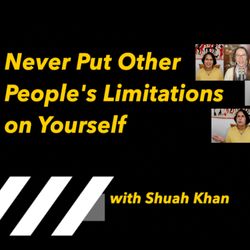
10. Never Put Other People's Limitations on Yourself
48:27||Season 3, Ep. 10We often talk about how tech and the open source ecosystem are both male-dominated environments. The numbers are bad, and while there's a lot that companies and communities can and should do, they can't fix everything.In this episode of the My Open Source Experience podcast, Shuah Khan opens up about her childhood and upbringing to share where she got some of her drive, motivation and spirit to embark on a journey from India to the United States and pursue a career in tech, and later on become a Linux kernel maintainer. Beyond having a successful open source career in open source and Linux, Shuah is also passionate about mentorships and improving inclusivity in open source communities.Learn more about:- Inspiring kids to be curious and pursue their dreams- Preparing for a successful tech career as a woman- Not putting other people's limitations on yourself- Pillars for building inclusive open source communities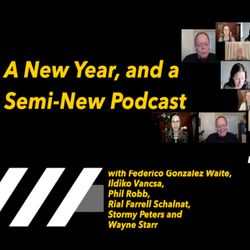
9. A New Year, and a Semi-new MOSE Podcast
46:28||Season 3, Ep. 9The new year brings a semi-new My Open Source Experience Podcast.In this epside of the MOSE podcast, Ildiko kicks off with an announcement about the podcast. She then transitions into topics that outline upcoming episodes in the thrid season, and further highlights for the new year.Learn more about:- Upcoming open source events in 2026- A retrospective on where the MOSE podcast started, and what is still applicable from the goals- Stormy Peters talks about the Mozilla Foundation and Mozilla Corp- Wayne Starr shares s=his experience working on OSS in his free time- Ria Farrell Schalnat talks about the legal community- Federico Gonzalez Waite shares his experience transforming the Mexican government to rely on OSS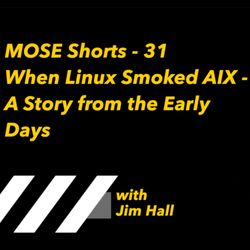
MOSE Shorts - 31: When Linux Smoked AIX - A Story from the Early Days
08:37|In this MOSE Short segment Jim Hall talks about his experience of introducing open source at every company where he worked. He also shares a story about starting to deploy Linux servers at one occasion, which outperformed the AIX systems that the company had at the time. They ended choosing Linux because it was the best technology for their use case on the market, with enterprise support and a very favoarble price tag. It just happened to be open source.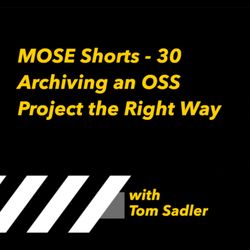
MOSE Shorts 30: Archiving a Project the Right Way
07:13|Technology, just as everything else moves forward, and sometimes that means that a project gets superseeded by something else that is better, more performant and a more promising options long term. When your project reaches this phase, it still matters what process you choose to follow when you archive it, since abandoning it silently from one day to the other is harmful to everyone else who is still relying on it and is under the impression that the project is still maintained by the community.In this segment of the My Open Source Experience podcast Tom Sadler talks about te TAL (TV Application Layer) project, which they have been using on TV devices. While the project is still used within the BBC in some corner cases, it is largely replaced by web technologies by now. When it comes to the open source project, maintainers of the project chose to mark it clearly archived on GitHub and even left an email address for people to reach out in case they have a question or comment about the project. Surprisingly, this provided an opportunity to the ecosystem to still connect about the overall technology and problem space, which turend into a tech meetup series.Learn about the stpes of archiving a project, such as:- Marking it 'Archived' on its hosting platform- Updating the README- Closing issues and bug reports- Closing Pull Requests or Reviews- Leave contact information, if there's still someone who can follow up on questions and commentsAlso keep in mind the CRA, as there are some requirements coming about how to properly archive a project!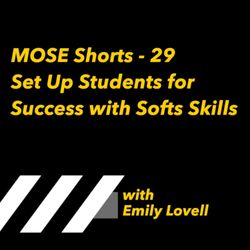
MOSE Shorts - 29: Set Up Students for Success with Softs Skills
08:52|In this MOSE Short segment Emily, Ildiko and Phil talk about the improtance of being able to make an argument to succeed in both open source and corporate environments. The group also discusses how mentorship programs that help students participate in open source projects can be encouraging for them to stay and thrive in the tech industry.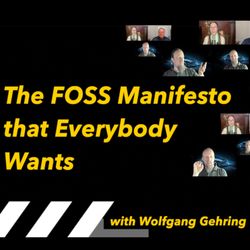
8. The FOSS Manifesto that Everybody Wants
42:12||Season 3, Ep. 8Deciding to go all in on open source is often an enormous milestone in itself, however, it is just a small first step in the overall change process. Many companies have the buy-in on the engineering level, and some have it in the top management as well, but that is not enough!In this episode of the My Open Source Experience podcast, Wolfgang Gehring shares his journey through this transformation within his company, Mercedes-Benz, which has been centered around a FOSS Manifesto that made a huge impact in the industry.Learn more about:- The Mercedes-Benz FOSS Manifesto- The influence the company achieved, internally and industry-wide, by publishing their manifesto: https://opensource.mercedes-benz.com/manifesto/ - Why the company made the manifesto available under the Creative Commons license- Automotive-focused open source groups- Knowledge building and sharing within a large company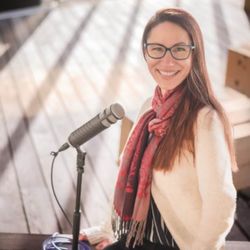
7. Let's Talk Business, Standards and Open Source
43:43||Season 3, Ep. 7Both business language and standards can be very strict, especially when we are looking into practices of governments or highly regulated industries like automotive and telecommunications. On the contrary, open source is developed by diverse groups, where standards and regulations don't apply to all use cases, and is often valued for its flexibility. So, how do all these fit together?In this episode of the My Open Source Experience podcast, industry experts explore how to fit open source into very strict processes and standards.- Ashan Senevirathne covers efforts in the telecom segment where standards, technology evolution and open source clash- Austen Bryan share his experience with fitting open source into the acquisition guidelines and processes that the United States government has- Magnus Buhrgard highlights examples of bringing open source standards and patents closer to each other- Philipp Ahmann talks about safety standards in the automotive industry, and highlights where open source is used within cars- Samson Goddy shares tips on how to talk about open source in corporate environments using business language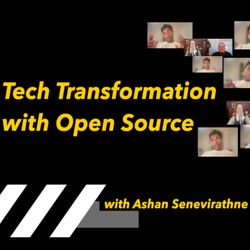
6. Tech Transformation with Open Source
44:14||Season 3, Ep. 6Technology provides a lot of opportunities and companies need to be flexible to grab them, but they aren't always ready. The telecommunications segment is an example where flexibility is not a given, historically.In this episode of the My Open Source Experience podcast, Ashan Senevirathne talks about his experience working for operators in the telecom segment. As operators are transforming their networks it's not enough to just into the software, they also need to evolve company practices and culture. Open source plays a key role in this overall transformation.Learn more about:- The five nines concept, and how that pairs with failing fast- Transforming a telco in to a tech-co- How ot get from strong proprietary culture to open sourcing a project- The role of FOSS guidelines- Open source business values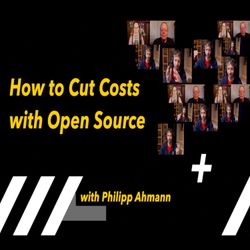
5. How to Cut Costs with Open Source
42:14||Season 3, Ep. 5Open source is still often looked at as free software, as in no cost. Those who think this is the value of OSS, they usually use and integrate it in a more expensive way than they should.In this episode of the My Open Source Experience podcast Philipp Ahmann talks about his experience with open source in the automotive industry, which is very sensitive to development, innovation and maintenance costs. He also shares a story about attempting to fix a plane's entertainment system in flight. Did he succeed?Learn more about:- Cost savings through relying on open source- The importance of reusability, and how open source supports that- Vendor lock-in with open source- The price of maintaining a fork downstream